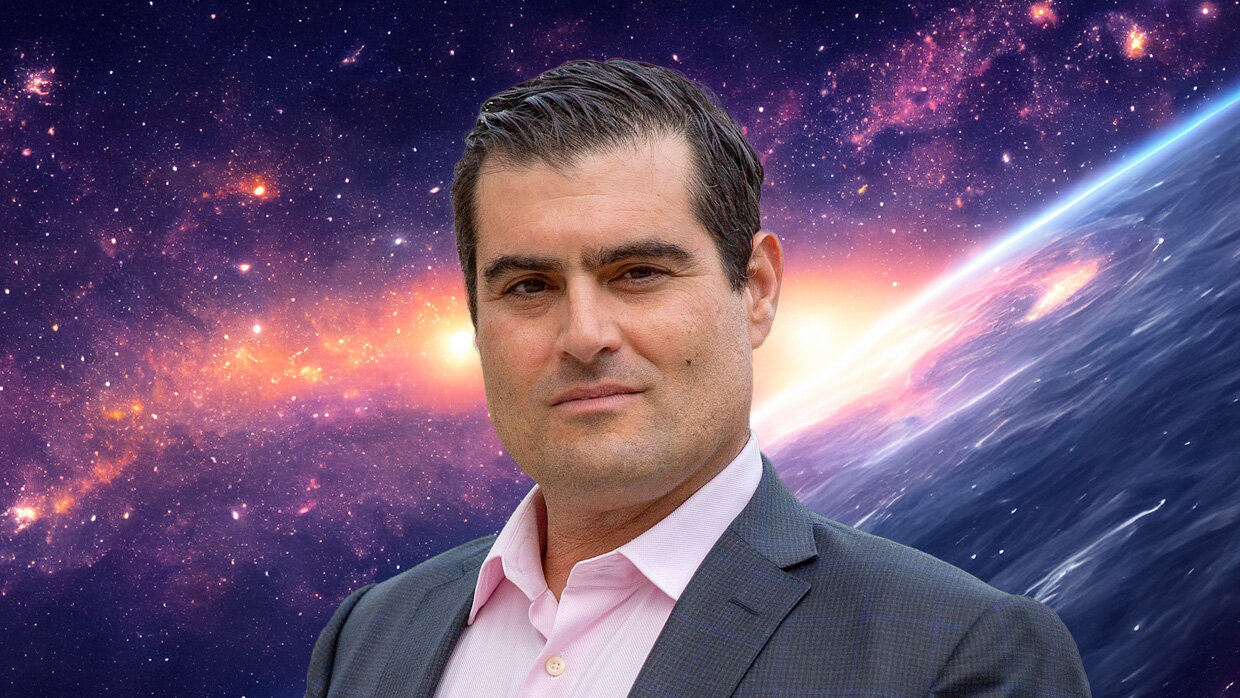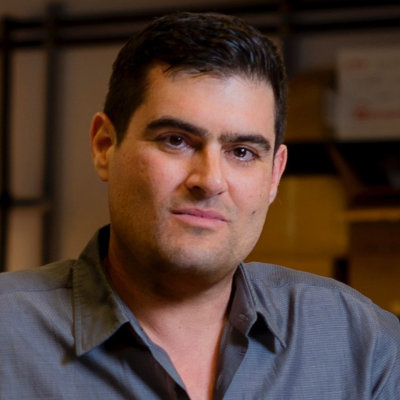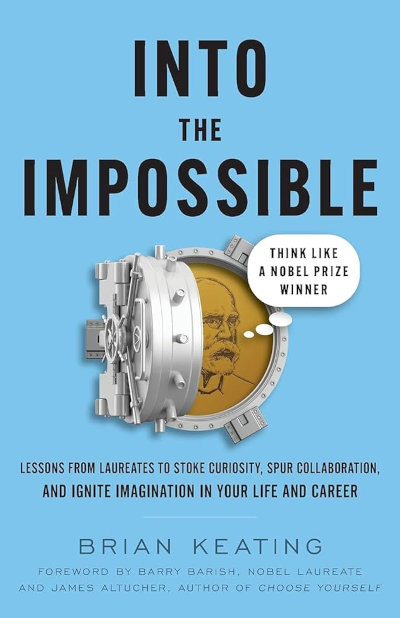 Iran’s Attack on Israel
Iran’s Attack on Israel


9 min read
A leading cosmologist, Dr. Keating was a Catholic altar boy before he discovered his Judaism later in life.
Dr. Brian Keating is one of modern cosmology’s greatest luminaries. He has a gift for taking extremely complex ideas and articulating them in a way that we regular people can easily digest, and he does it with wit and humor. It’s no wonder his books have been so widely read and his social media following is so robust. Dr. Keating is also a proud Jew who discovered his Judaism later in life. I was fortunate to recently interview him for Aish.com.
Adam Jacobs: There's a famous statement by evolutionary biologist Stephen J. Gould that science and religion are, as he put it, “non-overlapping magisteria,” the idea that everyone should stay in their lane. Religion might have what to contribute to the world, but it's in its own arena, and science is in its own arena. Do you agree with that approach, or do you feel that there is room for either collaboration or exploration or is there any point of connection between those two areas for you?
Brian Keating: For me, no, I don't look to the Torah for science. It's crystal clear to me that Torah is not a science book. It's not a reference. It has nothing to say scientifically. And that's why I think every scientist needs it, because doing science is the practice of people, and people need wisdom. To practice science (which means knowledge in Latin) divorced from wisdom is the ultimate form of pointlessness, as if a surplus of knowledge is tantamount to moral wisdom. That is fallacious.
I think science struggles with a meaning crisis, and that what we do is important, but to the extent that if it's just used for technology or acquisition of knowledge for its own gain, then there's a pointlessness to it. I think to be a complete human being, you need to have both the knowledge that science uniquely can provide and that the Torah cannot provide about the natural world. It'd be like having a single strand of DNA. It's functionally useless to just acquire knowledge without any associated wisdom coming from it or leading to it.
Adam Jacobs: How did you discover your Jewish roots, and how did you come to embrace them? Was there some catalyzing event that took place?
Brian Keating: I had a fairly tortured path to Jewish observance. I always knew I was born Jewish, whatever that means. Biologically speaking, my mother is Jewish. My father is Jewish, but like many children of the seventies, I experienced divorce. I lived with my mother's second husband, my stepfather, and he and my mother adopted us legally, changing our names to match her new last name when she remarried. That was a significant moment in my life because, at that time, I became religious for the first time in my life (I mean practicing Catholicism, not necessarily believing), but certainly practicing religion for the first time. Before that, it had been occasional sets of matchbox cars on the first night of Hanukkah, maybe a Passover dinner here or there. And that was it for the first seven years of my life.
As a kid, my mother married an Irish Catholic and I took to the church's rituals and practice.
Then, immediately following my mother's marriage, I became immersed in Catholicism and converted and was confirmed baptized within the span of just a few years to the Catholic Church of Chappaqua, New York. Having always had a curious and probably spiritual side, even as a kid, I just took to the Catholic church's rituals and practice. And the warmth of not only my family, my adopted family, but my stepfather's family, which was a huge Irish Catholic family of 10 brothers and sisters and millions of cousins and grandparents and great-grandparents.
Contrasting that with my biologically Jewish relatives, more or less shunning us after the marriage, then adopting us into their family and really almost believing that we were genetically biologically their kids. And I loved Christmas and Easter, just a huge pageantry and the food and drinking and everything else. I decided I wanted to learn more and become more serious about it at age 12 and became an altar boy in the Catholic church. Not too many Orthodox members of boards or directors of orthodox synagogues have former altar boy on their CV.
After 9/11, I had a notion that I better learn at least something about why Israel is at the center of the world's hatred and ire and the Western kind of hegemony and schisms and so forth. I had always had a bias towards Judaism, and a lot of my friends were Jewish. I was dating someone who wasn't Jewish at the time, but I felt like this was the time for me to wake up and learn more about it. At the same time, my older brother moved out west and lived with me in California. Thankfully, he had moved from Manhattan a year before 9/11. Then, he encountered an Orthodox Jew at his law firm in LA.

And they had taken him in and been very warm and supportive of him. He got involved in the Jewish community of Los Angeles, which is very different from the Jewish community of New York City, where he had lived and gone to Cardozo Law School. He had friends who were rabbis who never once invited him for Shabbat dinners. By the time he moved to LA, the first day he was in his law firm he was getting invitations everywhere. It was a very warm and welcoming community there.
As he started to learn more, I began to learn more and meet with the same kind of rabbis and folks that he was involved with. And I slowly began to learn and decided to read the Torah. I've never read it before.
I got involved with the community there, attended Shabbat services, and taught myself to at least pronounce words in Hebrew. Even if I did not know the language, I just went to services, learned and participated in holidays, and so forth. That was about 20-plus years ago. I then really resolved to grow, get married, and have a family in a Jewish Orthodox setting. So that's where I'm now, always trying to learn more and not sit content with either my scientific expertise or my religious learnings, so-called expertise.
Adam Jacobs: Why do you regularly learn the Torah, and do you recommend it to others?
Brian Keating: You have to have a certain level of understanding; otherwise, you're just a klutz asking klutz questions. But there are just so many platitudes about religion that scientists like Steven Weinberg and Lawrence Krauss do, and what I think undergirds their reasoning and their statements and their confidence (or arrogance) is that they had a bar mitzvah. I mean, I think it really comes down to that.
They're left in a permanently stunted premature state by virtue of their arrogance that because they learned to chant some meaningless tunes as a 13-year-old, and had a bad experience, that somehow they’re done with Judaism.
And universally (and this was true of my biological father), and it's true of Lawrence Kraus, and it was probably true of Carl Sagan and Stephen J. Gould all the way up and down the ladder is that their bar mitzvahs marked the graduation from ever thinking about the Torah again. And this has left them and those like them in a permanently stunted state with respect to their understanding of Judaism. They may be very smart, and there may, in fact be logical fallacies and scientific untruths, although I've looked for them, but I can't really find them, and it's hard to find them, but they would never accept the refutation of a physical law of a mathematical theorem—they would never accept the falsification and undermining of that from a 12-year-old boy.
And yet that's what they're doing with their understanding. They're left in a permanently stunted premature state by virtue of their arrogance that because they learned to chant some meaningless tunes as a 13-year-old, and had a bad experience, that somehow they’re done with Judaism. It was challenging to do my bar mitzvah last month at age 52. So I can only imagine what it's like at age 13. But to see them basically present just completely trivial objections that really amount to excuses based on a malformed prematurely developed understanding of religion is almost laughable if it wasn't often used in a really derogatory hostile format.
Adam Jacobs: What are your thoughts on the rise of antisemitism in the wake of 10/7? How do you understand the support for Hamas?
Brian Keating: I think it’s linked to the conflation of Western leftist hatred of America, which always comes concomitant with hatred of Israel. Ironically, the most progressive countries in the world, the US and Israel, are hated by the folks who call themselves progressive. I think there’s an element of self-hatred combined with nihilism that I last witnessed before 9/11, but not as much as after 10/7.

Adam Jacobs: As an academic and a Jew, how do you feel about the Harvard/MIT brouhaha and Harvard's president?
Brian Keating: I wrote about it many times on Twitter and spoke about it on YouTube. I’ll say that academia has long been a form of idol worship for our secular society, which is especially prevalent among liberal/secular Jews. This mindset often found young Jews feeling like failures because their parents prize college—and especially prestigious colleges like the Ivies—as the stamp of approval indicating they did a fantastic job. Neglecting their character and focusing on the five non-professor members of an admissions committee is pathetic and worthy of concern.
It’s no surprise the ethically compromised presidents of these universities would also find themselves investigated for other ethical lapses, which, sadly, are more widely condemned than their inexcusable reaction to antisemitism rampant on their campuses long before 10/7 but amplified immensely since.
Visit Dr. Keating’s website at https://BrianKeating.com and his Youtube channel at https://www.youtube.com/DrBrianKeating?sub_confirmation=1.

I think Dr. Keating - is a good example of - We are what we are - because - of an accumulation of all the stimulus events - people we’ve met - and the experiences occurring in our life - spiritually - mentally - emotionally - physically - financially. And it seemed like - it all happened quietly - and so fast. Now - we are what we are - and we can’t change our past. Interesting also - are those whom G-D has shown the truth - and they accept - and act on that. So now - we pray that - G-D - will give us - and all Jews - the wisdom - to accumulate - more of all those things - that will make us - a much better person - with an even better life - with Him!
I like Brian's show.
He's referenced his Judaism and hos path back to it numerous times. I'm glad he found himself.
I guess what's always bothered me is his statement that the torah isn't science but "wisdom." It's a secular trope that just bugs me. It trivializes Torah.
The Torah is at worst an amazing historical document. Time after time we find archeological evidence of the events and personalities described in the Torah, things that were chronicled nowhere else.
The Hittite Kingdom, the largest in the world for hundreds of years from roughly 1990BCE to 1200BCE, was considered by modern academics to be fantasy until 1905 when they found it and had to admit the Torah, the only real record of the civilization was in fact not simply "wisdom."
What else will we find?
Your early experience with false representations of Judaism reminds me of the story about the Rabbi whose student told him, "I don't believe in god." To which the Rabbi responded, "I don't believe in god either, at least not the god that you think you don't believe in. Now let's sit down and make the acquaintance of the true G-d. Now, HIM, I do believe."
I wonder why Dr. Keating only mentions the progressive left when he chastises antisemites. Was Charlottesville conducted by the "progressive left"? Were the assassinations at Tree of Life - Pittsburgh conducted by those on the left?
My first degree is physics and my interests are particle physics and cosmology. In college I was largely agnostic, having left a church that split because of my participation in the civil rights movement. Leaving the church led me to consider whether there might be truth in other religions and traditions. One of my greatest discoveries was "the days and nights of Brahma," an ancient Hindu view that the universe expands then contracts, a breathing out, and breathing in, and the time periods for this are BILLIONS of years. This idea is thousands of years old, and did not come as a result (so far as I know) from anything like modern science. SOMEHOW these ancient theologians had figured out what western science has only recently realized. How? How? Worth looking into I would propose.
Thank you, Dr. Keating, for so clearly explaining the phenomenon of assimilationist, liberal-leftist and self-hating Jews.
People are inclined to mistakenly think that if someone intellectually gifted rejects his Judaism, there must be a sound reason; however, you have successfully blown the cover on that bogus theory!
I'd just like to add that those who were "turned off" early on most probably were never exposed to authentic Judaism and have therefore unfortunately missed out.